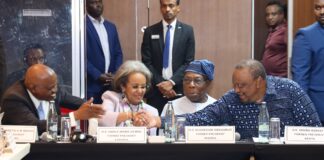Kenya could face significant diplomatic and security setbacks if its designation as a Major Non-NATO Ally (MNNA) of the United States is withdrawn, amid growing scrutiny from US lawmakers over Nairobi’s foreign and security policy choices.
The MNNA status, which Kenya secured in May 2024 during President William Ruto’s state visit to Washington, the first by a Kenyan head of state in 15 years, was widely seen as a reward for the country’s strong counterterrorism record and its alignment with Western interests in emerging global conflicts.
However, just over a year later, an amendment introduced in August by US Senator James Risch has triggered a formal review of Kenya’s eligibility for the designation. The legislation directs the US Secretary of State, in coordination with other senior officials, to evaluate Kenya’s status within 90 days, with Congress expected to publish its findings within 180 days.
The review will examine seven core areas, including Kenya’s efforts to counter violent extremism, its contributions to peacekeeping operations in Africa and Haiti, and its military and security relationships with rival powers such as China, Russia, and Iran.
The move reflects growing unease in Washington over Nairobi’s continued deepening ties with Beijing, particularly as US–China trade and geopolitical tensions intensify. Kenya has attracted major Chinese investment in infrastructure, including flagship projects under Beijing’s Belt and Road Initiative, raising concerns in the US over potential security and strategic vulnerabilities.
What Kenya Stands to Lose
Should Kenya’s MNNA designation be revoked, analysts warn the consequences could be far-reaching:
- Restricted access to US military financing and equipment: Kenya would lose eligibility for loans of military material, supplies, or equipment for joint research, development, and testing projects.
- End of fully funded training programs: The US currently covers the costs of bilateral and multilateral training exercises with Kenyan forces — a benefit that would disappear if MNNA status is withdrawn.
- Reduced priority for surplus defense equipment: Under Section 516 of the US Foreign Assistance Act, Kenya currently enjoys priority delivery of surplus military hardware, an advantage it would forfeit.
- Loss of access to depleted uranium ammunition: Kenya would no longer be considered for the purchase of advanced armor-piercing tank munitions.
- Exclusion from US defense maintenance contracts: The country would lose its ability to bid on repair, maintenance, or overhaul contracts for US Department of Defense equipment performed outside the US.
These changes would weaken Kenya’s military modernization efforts and strain its ability to sustain its role as a regional security anchor in East Africa, where it has been at the forefront of counterterrorism operations against al‑Shabaab and has deployed troops to peace missions in Somalia, the Democratic Republic of Congo, and Haiti.
Despite the looming review, Kenya’s Foreign Affairs Principal Secretary Korir Sing’Oei has sought to calm fears, insisting that the issues raised in the US congressional amendment would be “comprehensively addressed.”
“There is little to worry about,” Sing’Oei said, emphasizing that Nairobi would engage Washington constructively while safeguarding Kenya’s sovereignty and national interests.
The US review is expected to be rigorous, balancing Kenya’s strategic importance in counterterrorism and peacekeeping against concerns over its growing engagement with US rivals. Congress is required to issue a report within six months, and any recommendation to revoke MNNA status would mark an unprecedented setback in Kenya–US relations.
For President Ruto, who has positioned Kenya as a reliable Western partner while maintaining economic ties with China and Russia, the outcome will test his administration’s ability to navigate competing global powers without jeopardizing vital defense and security cooperation.
Written By Rodney Mbua



















